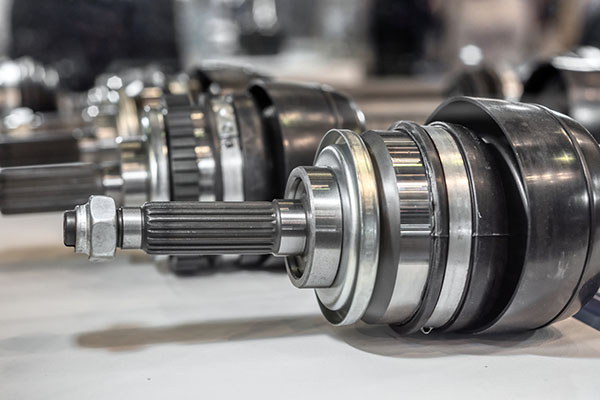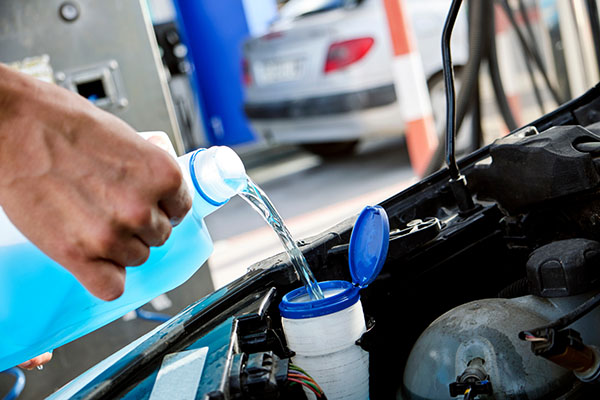Posted on 7/28/2023

As you cruise down the road, your vehicle's CV (Constant Velocity) joints quietly and tirelessly transfer power from the transmission to the wheels, allowing smooth steering and delivering torque. Yet, these crucial components often go unnoticed until they start causing problems. Today's article will shed light on CV joints, their role in the drivetrain, their location in the vehicle, when to maintain them, and how to keep them in optimal condition. What Are CV Joints? What Do They Do? CV joints are flexible couplings that connect the drive shafts to the wheels, enabling power transfer while accommodating the up-and-down motion of the suspension. Their primary function is to maintain a constant speed and torque, even as the wheels move up and down in response to road irregularities. This allows for smooth power delivery and flexibility during turns. Location of CV Joints Typically found in front-wheel drive vehicles ... read more
Posted on 6/29/2023

Your car's radiator is a vital component of its cooling system, helping to regulate engine temperature and prevent overheating. However, like any other part, the radiator can have issues over time. By recognizing these signs early on, you can address radiator problems promptly, ensuring optimal engine performance and preventing costly repairs. That's why you should continue reading and make sure to remember these easy-to-spot sights! 1. Rising Engine Temperature One of the first indicators of a radiator problem is a consistently rising engine temperature. If you notice that your temperature gauge is creeping into the red zone or that the engine is running hotter than usual, it's a clear sign that the radiator may not be effectively cooling the engine. This can be caused by a variety of issues, including a clogged radiator, coolant leaks, or a malfunctioning thermostat. 2. Leaking Coolant Visible coolant leaks are a telltale sign that yo ... read more
Posted on 5/31/2023

Owning a Mercedes-Benz is a luxury experience that requires proper care and maintenance to ensure longevity and optimal performance. Mercedes-Benz vehicles are engineered with precision and require specific maintenance to ensure their peak performance. That's why we have compiled a list of tips and tricks so your car can serve you for as long as possible. #1 Use The Right Oil Mercedes-Benz recommends using synthetic oil with a specific viscosity to maintain engine performance. Using the wrong oil can lead to poor fuel economy and even engine damage. Always consult with a Mercedes-Benz specialist or your owner's manual to ensure you are using the correct oil. #2 Keep Tires Inflated Maintaining proper tire pressure is crucial to ensure the best fuel economy, ride comfort, and handling. Check tire pressure regularly and keep it at the recommended level by the manufacturer. Overinflated or underinflated tires can lead to damage to surrounding a ... read more
Posted on 4/30/2023

If you are wondering what BMW has in store for us this year, you are in the right place. Below you will find three interesting models by the German manufacturer, which also carry a pretty big price tag. Keep in mind that they are all new concepts or the newest iteration of 2023 BMW i7 - The Sedan Of The Future BMW released its i7 model a few weeks ago, and it's just a glimpse at what they have in store for us in the future. It has a very modern design looking at it from the outside, but things get even better on the inside. The interior is equipped with an amazing ambient lighting system that goes through the dashboard. The engine powering it is actually not an engine but two electric motors pushing out a whopping 536. An added bonus is the large storage area it has - especially in the backseats. It is an excellent sedan overall, and it screams BMW with its trademarked front grille and interior. 2023 BMW XM - High-Performance SUV The newe ... read more
Posted on 3/30/2023

With one-fourth of 2023 gone by, Lexus has already announced some of its new releases. Some are revamped 2022 versions, and some are quite different from anything we have seen before. Below, you will find three of the best upcoming vehicles from Lexus for 2023. 2023 Lexus RX With the 2023 version, the RX has gone through a complete overhaul. Because of that, it has become very popular and wanted. It offers the same reliability that every other Mazda model has with the addition of a plethora of engine options, from powerful combustion ones to hybrid systems. MSR for the base RX 350 model starts at $48,550 and has a 275-hp turbocharged 2.5-liter engine. 2023 Lexus LC 500/500h The LC 500 and 500h are luxury coupes with a modernistic and classy design that offer quite a bit. The LC 500 has a 5.0-liter V8 engine, accompanied by a 10-speed automatic; after all, it's a performance coupe, so it has to have a big, mean engine. And for the 500h, it is a ... read more